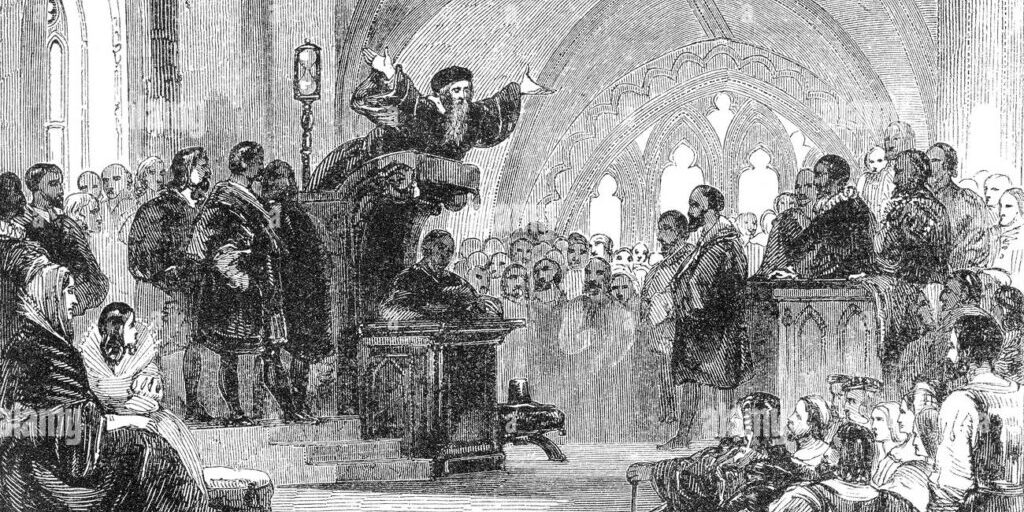
Reformed Scholastics in the Pulpit?
To ask whether the Reformed Scholastics can serve our preaching today likely sounds to most pastors as absurd as the answer is obvious. Parading Latinate sentences, obscure jargon, and speculative theological abstractions with no practical relevance to the Christian life in the pulpit? Unfortunately, these caricatures of scholasticism misrepresent its goal, which was explicitly tied to the ministry of the Word, and so it can still serve that ministry today.
In our pews sit Christian minds that are muddled by a wider culture that has abandoned clear and consistent thinking – and our pulpits often offer little help. T. David Gordon observed:
… sermons reflect the babbling, rambling quality of a typical telephone conversation. The discourse consists of a series of unrelated observations that occurred to the minister as he read the passage (or other books about the passage), but there is little apparent unity or organization. Further, ministers display very little judgment about what is significant and what is insignificant.[1]
We Distinguish!
The pulpit’s fog has fed the pew’s mental mist by preaching that fails to carefully distinguish. And if the Reformed scholastics had had a marketing slogan, it would have been “We distinguish.”[2] That may not initially strike us today as all that vital to Christians, let alone devotional or practical, but this is only ignoring what we all assume – we distinguish what we value and want to know truly. Sinclair Ferguson explained:
Scholastic is often used as a theological slur intended to introduce a bad odor. Yet the people who use it thus are sometimes the very people who become hot under the collar if strangers refer to a fastball as a “slider” (in baseball) or confuse an eagle with a double bogey (in golf) or, for that matter, describe someone living in the Carolinas as a “Yankee” or a Scot as “English”! Aren’t these merely “scholastic” distinctions? To ask the question is to answer it. Right understanding always involves making careful distinctions.[3]
If Christians are to know God truly, and so to live before him rightly, distinctions are unavoidable. So, they are integral to our preaching. The Reformed scholastics understood that, and it was the explicit motivation for their teaching and writing. In our pews sit Christian minds that are muddled by a wider culture that has abandoned clear and consistent thinking – and our pulpits often offer little help. Click To Tweet
The Reformed scholastics, though from a different time and theological world, might have appreciated James Denny’s sentiment, “I don’t care anything for a theology that doesn’t help a man to preach.”[4] They studied the logical coherence of the faith in order to establish a basis for sound ministry and practice, believing “[t]heology must issue forth in preaching or holy discourse (oratio sacra) and other aspects of ministry.”[5] Their exhaustive consideration included the nature of the theological task, which they most often defined as “theoretical and practical.”[6] Typical scholastic definitions of theology argued:
Theology consists not of bare and empty theory but of a practical science that powerfully stirs the human will and all the emotions of the heart to worship God and to cherish one’s neighbor.[7]
… that theology is more practical than speculative is evident from the ultimate end, which is practice. For although all mysteries are not regulative of operation, they are impulsive to operation. For there is none so theoretical (theoreton) and removed from practice that it does not incite to the love and worship of God. Nor is any theory saving which does not lead to practice.[8]
It is such an art as teacheth a man by the knowledge of God’s will and assistance of his power to live to his glory. The best rules that the ethics, politics, economics have, are fetched out of divinity. There is no true knowledge of Christ, but that which is practical, since every thing is then truly known, when it is known in the manner it is propounded to be known. But Christ is not propounded to us to be known theoretically but practically.[9]
Of course, we could not forget William Perkins’s justifiably famous definition: “Theology is the science of living blessedly forever.” When you compare these standard explanations with our rather narrow definitions of theology today, which assumes a real division between theology and Christian practice, one wonders whether it’s not our own day that has succumbed to the acid of rationalism. One wonders whether it’s not our own day that has succumbed to the acid of rationalism. Click To Tweet The Reformed scholastics labored to distinguish according to scripture to serve the glory of God in public ministry. In their attention to homiletics, logical entailments, incomprehensible wonder, theological definitions, and illustrations, the Reformed scholastics remain an important resource for preachers today.
A Scholastic Homiletic
Notable Reformed scholastics, like Francis Turretin, were known as great preachers.[10] Turretin preached doctrine with careful attention to the scriptural text and, with pastoral insight, called Christians to respond in faith and obedience.[11] Petrus Van Mastricht prefaced his entire Theoretical-Practical Theology with “The Best Method of Preaching”[12] and understood the whole, including his orderly presentation of doctrines, as a guide and example for preachers.[13] Frans Burman gave detailed instructions for preachers, including a model outline of preaching, from introduction to exposition, application, and dealing with errors.[14] Many meandering preachers – and struggling hearers! – would be helped by considering the homiletical insights given by the scholastics.
If preaching is, as Martyn Lloyd-Jones once suggested, “logic on fire,” then who better than the Reformed scholastics to provide the logical kindling for the pulpit? As they present the necessary entailments of biblical doctrines, they even provide preachers with shock value to awaken their hearers. Take, for example, John Owen’s argument against the Arminian rejection of God’s immutable decree, where he deduces:
To ascribe the least mutability to the divine essence, with which all the attributes and internal free acts of God are one and the same, was ever accounted ὑπερβολὴ ἀφεότητος, ‘transcendent atheism,’ in the highest degree.[15]
To impress the importance of the Lord as the One who “does not change” (Mal 3:6), preachers can unfold how ascribing any change to the being of God in response to His creatures is nothing less than theoretical atheism! It supposes God to be indistinguishable from the ever-changing nature of creation and, therefore, not the Creator at all. The Scholastics labored to distinguish according to Scripture to serve the glory of God in public ministry. Click To Tweet
Scholastic logic can also lead pastors to press their hearers’ consciences and address contemporary questions. When Van Mastricht considers divine beatitude, he argues:
He who exists as the cause of all blessedness for all things, such that they have nothing that they did not receive, and that they did not receive from him – would he himself not be blessed? What he has granted others, would he not have? Therefore, either there is no blessedness, though every creature, and especially every rational creature, cries out in desire for it; or, God is blessed.[16]
God’s blessedness raises important issues about the universal human quest for happiness. Why do we all want to be happy? What does that say about who we are and why we are? Because God is happy in himself and created us to rejoice in him, we know that joy and happiness are real. If this isn’t true, then even our fleeting moments of joy are a delusion, a material phenomenon, and this life is as good as it gets. Man’s quest for happiness is fertile ground for pressing the existence of God and the hope of the gospel of our blessed God (1 Tim. 1:11) on our hearers.
Or, what about that ubiquitous cultural slogan, “Love is love”? When love is properly distinguished as not something different from God, but the propensity of His benevolent will to make us like Him, the emptiness of that tautology is exposed. Any affection or action can only be labeled as love when it conforms to the revealed will and character of God Himself, love’s archetype. Whatever people shout on the streets, love is not and cannot be love.[17]

